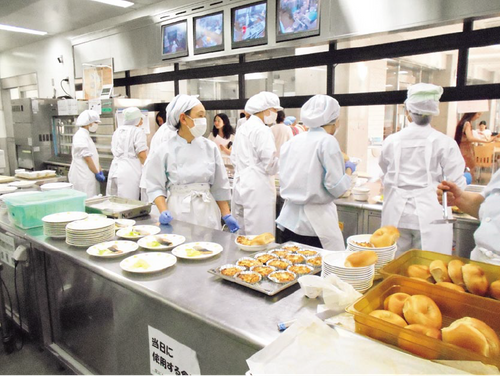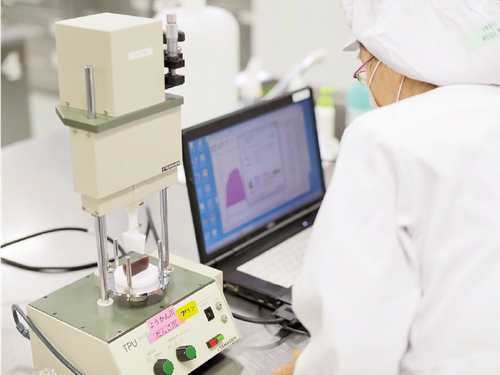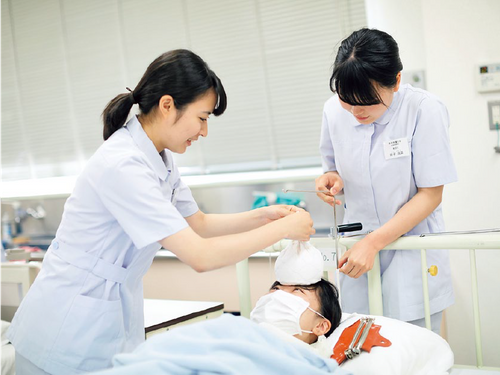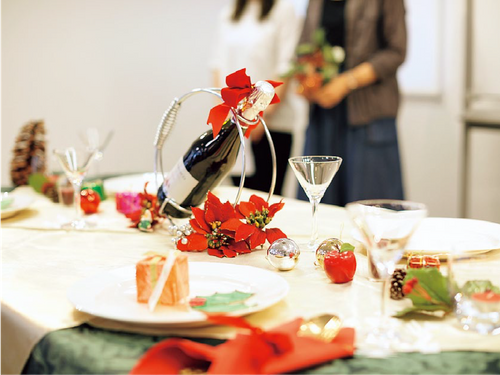Undergraduate School
Department of Applied Nutrition

Sakado Campus,
Enrollment capacity:200 students
The department develops registered dietitians who command extensive specialist knowledge, a broad perspective, and advanced skills that enable them to work as healthcare and dietary education experts helping people in a diverse range of social spheres achieve good health through food. Students are encouraged to use their basic registered dietitian studies as a foundation upon which to build. We expect them to imagine the type of dietitian they aspire to be and to make their own choices about which knowledge to extend and which techniques to improve. To enable them to make such choices, the department offers multiple professional courses as electives: Clinical Nutrition, Social Welfare Nutrition, Community Nutritional and Dietary Support, Sports Nutrition, Food Service Management, and Food Product Development. Students can also acquire Class 1 nutritional teacher’s licenses.
The ideal student is:
- Curious and inquisitive about food and health. She should be keen to acquire the knowledge and skills necessary to plan and provide meals, and to put their nutritional science knowledge into practice as a registered dietitian engaged in work such as providing nutrition counseling for the sick and injured.
- An empathetic, sensitive individual who fully understands the value of life and is passionate about contributing to human health and social welfare.
Department of Health and Nutrition

Division of Nutrition Science
Sakado Campus,
Enrollment capacity:100 students
The division offers four courses (Clinical Laboratory Technology, Home Economics Teaching, Health & Sports Nutrition, and Food Safety Management), aiming to go beyond conventional nutritionist studies in food and nutrition to develop new types of nutritionist who combine these conventional studies with additional studies in a specialist field.
The division cultivates highly skilled professionals who can fulfill the diverse needs of modern-day society. They include clinical laboratory technicians who can work as part of nutritional support teams in hospitals and clinics, home economics teachers who nurture independent members of society by teaching about food, health and sports nutritionists who help to improve health and fitness, and personnel responsible for food product development who help to maintain and enhance public health by managing food safety.
The ideal student wants to work in:
- Healthcare or medicine as a clinical laboratory technician with specialist expertise in nutrition
- Teaching as a home economics teacher with specialist expertise in dietary education
- Health advisory services as a nutritionist with specialist expertise in exercise (i.e., sport)
- Corporate business, pursuing an interest in food product development and safety management

Division of Health and School Nursing
Sakado Campus,
Enrollment capacity:50 students
The division cultivates empathetic school nurses who build on a basis of specialist knowledge in health science and nutritional science to equip themselves with practical and teaching skills, acquiring the expertise to deal with issues relating to children’s maintenance of physically and mentally healthy lifestyles. Students acquire Class 1 licenses to work in kindergartens; elementary, junior high, or high schools; or special needs schools. According to a report in 2008 by Japan’s Central Council for Education, from now on school nurses in educational settings will be required to play central roles in promoting health-related activities in schools and to act as coordinators. Accordingly, the division offers courses focused particularly on needs in schools and cultivates human resources who can meet expectations within educational settings. Students can also acquire licenses as health studies teachers (in junior high and high schools) or as nursing teachers (in high schools).
The ideal student has:
- A strong ambition to become a school nurse
- A love of children and of the school nursing profession
- A desire to protect and nurture children’s physical and mental health
Department of Food Culture and Nutrition

Sakado Campus,
Enrollment capacity:87 students
Promoting All-Round Competence through a Variety of Expertise-Enhancing Electives and Field Study Options
The department nurtures all-round competence by offering a variety of electives that enhance expertise and field study options. From the third year, students take separate courses according to the workplaces they are targeting after graduation. These courses comprise Food Culture Research, Food Services, Food Presentation, Food Planning, and Culinary and Confectionary Professionals. The department also offers specialist subjects taken by all students, including Management and Food Coordination Basics, Specialized Culinary Skills, Design, and Food Culture Theory. It has structured a systematic curriculum comprising a variety of electives and ample practical study options to enable students to demonstrate an array of skills in diverse settings.
Its educational policy is:
- To provide an education system that enables students to acquire specialist knowledge and skills from multiple food-related fields
- To consistently cultivate students’ awareness of themselves as food experts and nurture their planning and communication abilities from the very first year
- To support students with career planning from early on by offering internship programs, etc.
- To offer opportunities for improvement of individual expertise through the course system from the third year on, and for students taking certain culinary and confectionary courses to undertake specialist studies
- To extend provision of hands-on, self-directed learning through practical study and field work



